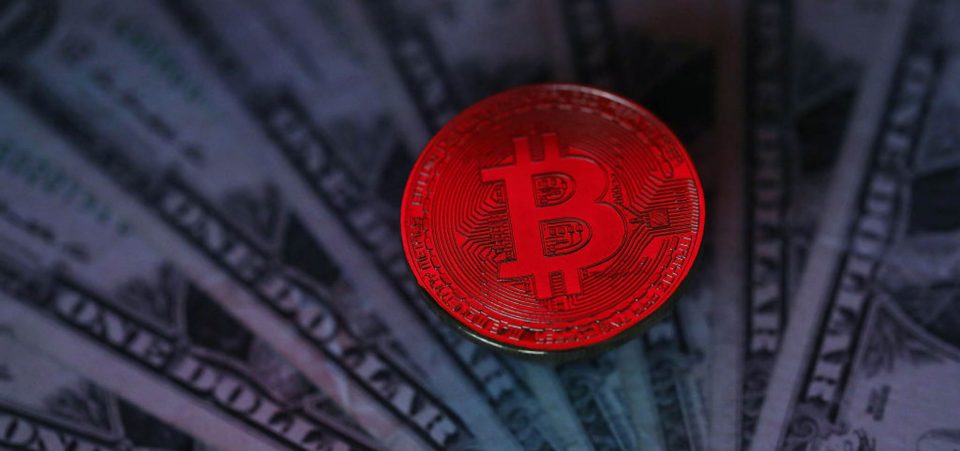Saxo Bank’s “Outrageous Predictions for 2018″ Sees Bitcoin Prices Cratering More than 92%
Saxo Bank A/S is pulling out its crystal ball for 2018, and it doesn’t portend well for the world’s patriarchal cryptocurrency. They see Bitcoin prices imploding 92% from today levels, touching $1,000 at some point. Credible or simply attention-grabbing clickbait? Let’s take a look.
The prediction comes courtesy of Saxo Bank’s annual “Outrageous Predictions for…” series. Every year, like many investment banks on Wall Street, they give a series of outlier predictions that no one sees coming. This year, the direction they see Bitcoin for Bitcoin is decidedly down.
Obviously, the very nature of such low-probability guesswork means that most of Saxo’s prognostications will miss the mark. This year won’t be any different. However, they’ve been right before about the direction of Bitcoin, so we shouldn’t dismiss their outlier prediction as mere attention-seeking.
For instance, in December 2016, they correctly foresaw the price of Bitcoin tripling from its then-current levels. That prediction was hugely conservative, as it turned out. But Saxo’s wildly correct forecast lends credibility to their Bitcoin analysis this time around. Here is Saxo’s quote from that time: “we could see Bitcoin easily triple over the next year going from the current $700 level to +$2,100.” (Source: “Saxo Bank predicts Bitcoin collapse to $1,000 in 2018, Sovereign Man, December 7, 2017.)
Why so bearish this time around? Saxo cites dual reasons; both, in my opinion, legitimate. In the end, it’s about control and transparency; two attributes which seem well beyond every sovereign government’s grasp.
China and Russian to Unleash A Multi-Pronged Assault in Bitcoin?
Saxo Bank believes China and Russia will unleash an assault on the decentralized cryptocurrency ecosystem that will shift focus away from bitcoin. The motivation will be continued concerns about capital flight, although it will be sold under the guise of environmental control.
Remember, China willingly gave up its dominance over jurisdictional Bitcoin control this year. For a short time between late 2016 and early 2017, over 90 percent of Bitcoin exchange trading took place on Chinese mainland exchanges. China had an influential position in almost every important regulatory, policy-making, and marketing aspect of Bitcoin. They even have prime BTC mining territory, with abundant cheap electricity and frigid terrain in which to set up shop. Yet, the Chinese government drove Bitcoin away. Why?
We can say many of the same things about Russia. No, they’ve never enjoyed any significant sphere of influence in Bitcoin. However, they too have ideal BTC mining territory and some of the most brilliant computer programmers in the world. Far from moving closer to Bitcoin, they’ve been moving away from it.
President Vladimir Putin has already denounced Bitcoin on crime prevention grounds back in October 2017. Putin proceeded to back moves to block websites dealing in Bitcoin as a way of halting exploding adoption rates. Claiming that “the use of cryptocurrencies bears serious risks,” Putin also supporting additional regulations from Russia’s central bank to throttle popularity. (Source: “Putin, Russian central bank come down hard against bitcoin,” MarketWatch, October 11, 2017.)
In short, it’s clear that neither of these countries will be supporting the usage of Bitcoin. Why? The answer is two-fold.
First, Bitcoin is being used as a way to launder capital out of countries. China, for example, had experienced 22 straight months of capital outflows prior to September 2017. Bitcoin was a primary vehicle for that. It was only after China chased its Bitcoin exchanges away that capital outflows started reversing. Coincidence or incidental? I believe the former, at least in large part.
Second, Saxo believes that China and Russia will seek to develop their own state-controlled versions of Bitcoin. This would involve less decentralization and give the government the ability to monitor, regulate, and trace all payment histories. Right now, they don’t have any of that. Until those areas are brought under governmental control, bitcoin is likely a useless commodity to them, however good the technology might be.
With full state and legal backing, combined with enhanced price stability, Saxo Bank asserts that this move state cryptos will “drives a decreasing interest in all cryptocurrencies and completely sidelines the Bitcoin and crypto phenomenon.” (Source: “Outrageous Predictions for 2018,” Saxo Bank A/S, last accessed December 8, 2017.)
Indeed, Russia has already gone all in. In mid-October, just a few days after they denounced Bitcoin, Putin officially declared that Russia would issue its own “CryptoRuble.” The state announced that the new cryptocurrency could not be mined, and would be issued and controlled only by the authorities. (Source: “BREAKING: Russia Issuing ‘CryptoRuble’,” The Cointelegraph, October 15, 2017.)
Verdict
It’s not all fire and brimstone from Saxo Bank though. They believe that the Bitcoin bubble will persist for most of 2018, fueled by bullishness over the advent of Bitcoin derivatives on major exchanges like the Chicago Board Options Exchange (CBOE) and CME Group Inc (NASDAQ:CME).
They have Bitcoin prices cresting at a whopping $60,000/BTC, bringing its market cap to $1.0 trillion—making Bitcoin bigger than Apple Inc. (NASDAQ:AAPL) on an aggregate valuation basis.
Although Saxo Bank’s prediction is certainly “out there,” they do bring up very solid points. Government’s natural inclination is to exert control over things they don’t already dominate.
Bitcoin has proved to be one of the more effective ways to launder money and avoid taxation. There’s also questions about price stability, which Bitcoin will probably never obtain because of its tight supply. Finally, Bitcoin still lacks many of the regulatory structures critical to consumer protection. Several high-profile Bitcoin hacking thefts come to mind.
I’m a big believer in the utility of cryptocurrencies and Bitcoin as a concept. But, if there’s a determined global commitment to stop Bitcoin from becoming a legitimate payment system, gravity could reverse quickly.
Until that effort picks up steam, Bitcoin prices should get crazier yet.






